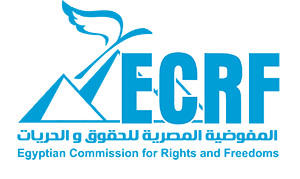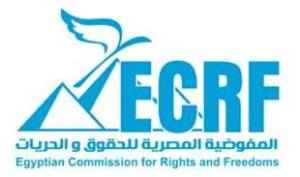A month after the beginning of the school year: The poorly structured infrastructure of the educational facilities remains the significant obstacle to the advancement of the educational process

Oct. 23rd 2018,
ECRF is concerned about the actions taken by the Ministry of Education and Technical Education, in regards to applying the new education system in pre-university education, during the first month of the academic year 2018/2019.
Starting on the first day on Sept. 22nd 2018, third grade student “Ibrahim Hassan Abed Rabbo” died after being run over by the feet of his colleagues in the Zahra primary school, in Bilqes in Daqahlia, while several students were injured as a result of the scramble to reserve seats in classrooms.
Those incidents were the result of the high student density in school classes that has reached up to 120 students per a classroom, with multiple periods of study in one school, which is a phenomenon that has been going on for nearly fifteen years and the Ministry of Education has not succeeded in finding effective solutions for.
It was the end of the first month of the pre-university education academic year and the Ministry of Education has not taken any serious steps into implementing the new education system to which the ministry has not yet published either the executive plan for their application or its schedule, as well as a conflict and postponement of the dates announced by the ministry to develop curricula, distribute the tablets to students, and train teachers to deal with the new education system.
While the new educational system aims at digitizing the educational process to improve its quality, the reality of the education system in Egypt shows that the process of digitization appears to be on a system of which the infrastructure is poorly maintained and exhausted, which makes it questionable and difficult to achieve on the ground, since the main problems facing the Egyptian education system related to; the high density in the classrooms, the depletion of infrastructure for some schools, the lack of schools in some villages in Egypt, in addition to weak government funding for education, the poor level of teachers, their material and administrative problems, and the problems of the administrative apparatus and the ministry; all prevent any real step in improving the quality of the educational system.
And Ministerial Decision No. 10, which was issued by the Minister of Education on Oct. 10th 2018, which stipulates that no media – visual or audiovisual – shall be allowed to enter the schools belonging to the educational districts at the level of the Republic, or to make any conversations or meetings except only after the presentation to the Office of the Minister, raises doubts about the credibility of the Ministry of Education, as the quality of education in Egypt, requires the active participation of the community, parents and students themselves, as well as the media’s role in monitoring the educational process, transferring information, discussing challenges and proposing solutions.
The ministry also aims to stimulate the private sector to invest in education in order to fill the deficit in the infrastructure of the education system, which must be under the monitoring and full supervision of the Ministry of Education, as well as involving the civil society in the oversight process, ensuring the realization of public rather than private interest – providing education for students who are unable to afford public schools – so as to not try this experience in an effort to threaten the chances of upgrading the educational system in Egypt, and its violation of international conventions and treaties signed by the Egyptian government.
This trend raises serious concerns about the negative effects on the enjoyment of the right to education, in particular with regard to the availability and accessibility of free education, equality in educational opportunities and quality of education.
The Ministry of Education must adhere to its role in providing quality and free education as stipulated in the Egyptian Constitution.
ECRF asserts to the decision-makers at the Ministry of Education and Technical Education, to commit to sharing information with the competent authorities of civil society organizations and international organizations, to fully present the new system to the parents, so that this experiment succeeds.
ECRF also affirms the Egyptian government’s need to be fully committed to the legislation of the Egyptian Constitution and international law on the right to education, as well as the total implementation of Article (19) of the Egyptian Constitution, which stipulates that education is the right of every citizen, of which its goal is to establish the scientific method of thinking, to develop talents and encourage innovation, to consolidate cultural and spiritual values and to establish the concepts of citizenship, tolerance and non-discrimination.
The article also stipulates that the State shall guarantee its immunity in its various stages in the State educational institutions, according to the law and allocate a proportion of government spending for education not less than 4% of GNP, to be gradually rising to conform to global rates, and that it is supervised by the State to ensure that all public and private schools and institutes comply with their educational policies.
Article 13 of the International Covenant on Economic, Social and Cultural Rights, stated that the educational system is committed to ensure free education, that there is adequate infrastructure and qualified teachers capable of supporting the provision of educational services, that the educational system is unbiased and accessible to all, to take positive steps to include the most marginalized groups, that the content of education is relevant, unbiased and culturally appropriate, and of high quality, that schools should be safe and that teachers should be professional, that education should evolve with the changing needs of society and address inequality, such as gender discrimination; and that education adapts to locally defined needs and contexts.





